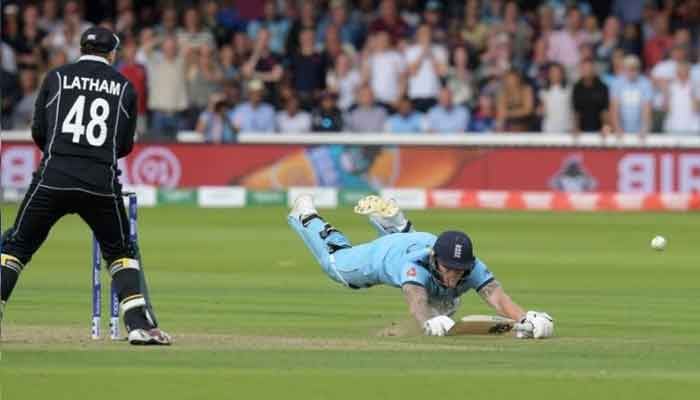Boundaries rule, overthrow decision down New Zealand in World Cup final
A tie-breaker rule meant the World Cup winners are decided by the number of boundaries. England smashed more boundaries than the New Zealand to win the maiden title. England had finished on 241 all out in pursuit of New Zealand's 241-8, then both sides scored 15 in their six-ball Super Overs.
What a game it was that kept the cricket lovers stick to the screens through out the contest. New Zealand came desperately close to winning the World Cup for the first time at Lord's after both the match and the Super Over ended tied.
As per tie-breaker rule, the World Cup winners are decided by the number of boundaries. England smashed more boundaries than the New Zealand to win the maiden title.
England had finished on 241 all out in pursuit of New Zealand's 241-8, then both sides scored 15 in their six-ball Super Overs.
Williamson conceded it was the most painful way to lose, but he refused to condemn tournament organisers the International Cricket Council.
New Zealand sports minister Grant Robertson questioned the tie-break method.
"What an extraordinary game. Not sure Super Over is the right end," he tweeted.
"Whatever, NZ you can be so, so proud of this team."
Former New Zealand player Scott Styris reportedly labelled governing body the ICC "a joke" over the rules but congratulated both teams on a tremendous efforts.
Former New Zealand captain Stephen Fleming's one-word reaction to the result was "cruel".
Even Gerard Stokes, a former New Zealand rugby league international who took his son to England as a boy while he pursued his career, said honours were even.
Crucial overthrow ruling
Besides the boundary rule, overthrow decision also hindered Black Caps to become the Champions by winning the cricket world cup.
According to the experts, umpire should have awarded five runs instead of six when Ben Stokes accidentally diverted Martin Guptill’s throw to the third man boundary as he attempted to scamper back for a second run in the last of England’s initial 50 overs.
Former leading umpire Simon Taufel, on the situation, was quoted as saying: "There was a judgment error on the overthrow.
"The judgment error was the timing of when the fielder threw the ball. The act of the overthrow starts when the fielder releases the ball. That's the act.
"It becomes an overthrow from the instant of the throw.
"They did not cross on their second run, at the instant of the throw. So given that scenario, five runs should have been the correct allocation of runs, and Ben Stokes should have been at the non-striker's end for the next delivery."
The ICC have yet to comment on the matter, while The Cricketer has requested comment from MCC.
Dharmasena's controversy
On the other hand, some of the critics slammed Dharmasena's appointment as an umpire for final despite his wrong decision in semis. Usually when an umpire makes a clear mistake, he doesn’t get a posting for the next big match.
-
Toronto Blue Jays roster faces setback with multiple injury concerns
-
Pacers vs Knicks overtime thriller ends in heartbreak for New York
-
Cavaliers vs Nuggets showdown heats up after blockbuster trade
-
Thunder vs Lakers: LeBron James playing as Lakers miss Luka Dončić
-
Pistons vs Hornets recap: brawl erupts with 4 players getting tossed before Detroit victory
-
Barack Obama hails Seahawks Super Bowl win, calls defense ‘special’
-
Seahawks Super Bowl victory parade 2026: Schedule, route & Seattle celebration plans
-
Super Bowl 2026 live: Seahawks defeat Patriots 29-13 to win Super Bowl LX













